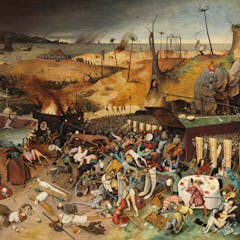
Articles sur Pandemic
Affichage de 501 à 520 de 1577 articles

NFL star Aaron Rodgers has amplified dangerous and disproven myths about the COVID-19 vaccine. Here’s why his statements are not only untrue, but also harmful because they spread misinformation.

To help increase trust in vaccines, researchers analyzed data on adverse events to address safety concerns, and then used cognitive science to show how cognitive biases feed vaccine hesitancy.

The pandemic has left many looking for work as part of a longer term decline.

To convince 18- to 30-year-olds to get vaccinated, three doctoral students designed an innovative, fun, non-judgmental quiz.

Our food systems are failing to feed all of us.
In this episode of Don’t Call Me Resilient, we pick apart what is broken and ways to fix it with two women who battle food injustice.

The COVID-19 pandemic has highlighted the problem of food insecurity for many people, especially racialized and Indigenous households.

Routine collection of work information from people testing positive for COVID-19 from the start of the pandemic would have enabled better understanding of the role of workplaces in transmission.

The majority of front page reports were negative in tone, seeing very little possibility for individual agency and self-efficacy. This can amplify public anxiety and fear.

Theatre companies who experimented with outside performances during the pandemic should not abandon them.

An infectious diseases doctor reviews the evidence, discusses hesitancy and concerns about side-effects and explains the overwhelming case for vaccinating five-to-11-year-olds, including his own son.

Some viruses go extinct, while others stick around. The virus that causes COVID-19 seems likely to remain with us for the long term.

While neoliberalism has allowed U.S. markets to grow, the resultant stunted public health system left Americans to figure out how to protect themselves from COVID-19 and its fallout on their own.

Machine learning algorithms can help public health officials identify areas of high vaccine hesitancy by ZIP code to better target messaging and outreach and counter misinformation.

This approach would cause an outcry, but when it comes to homelessness, addressing only the symptoms has been the norm.

How can nations prevent more pandemics like COVID-19? One priority is reducing the risk of diseases’ jumping from animals to humans. And that means understanding how human actions fuel that risk.

Vaccination campaigns like the ones that eventually eliminated polio and measles in the United States required decades of education and awareness in order to achieve herd immunity in the U.S. population.

When making the decision whether to vaccinate children aged five to 11 against COVID-19, regulators in Canada must rely on sound ethics as well as sound science.

The pandemic ushered in a renaissance of outdoor living. We need to advance the momentum for outdoor play to support the health and development of children

Virologists are beginning to assess which other viruses could have pandemic potential

Halloween, with its mix of the macabre and the playful, provides a moment to reflect on how closely life and death are interwoven – especially in the COVID era.
